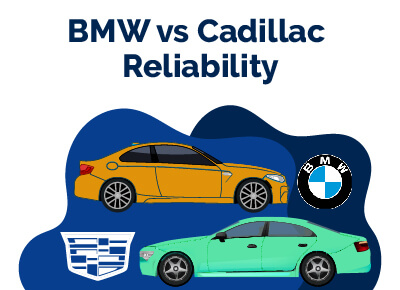BMW vs Cadillac: Which Is More Reliable?
May 31, 2023


Chris is Head of Content for FindTheBestCarPrice and is based out of Philadelphia, PA. As a seasoned automotive industry analyst and car enthusiast, he ensures the highest level of quality across all our content and curates our picks for the best deals each month.
Chris studied information systems and marketing at Drexel University and writes about a wide range of topics ranging from car buying tips to troubleshooting common mechanical issues.
When he’s not thinking about cars, he likes to stay in with his dog and make an “attempt” to finish a crossword puzzle (he’s not quite at the Saturday/Sunday level…yet). As a former cheesemonger, Chris still has a “sharp” passion for all things cheese, and his fridge is always loaded with it!
Chris also has a passion for things that go fast, and drones are no exception. He spends some of his time writing for Dronesourced.
In 1917, the Munich-based company Rapp-Motorenwerke transformed into BMW, which stands for Bayerische Motoren Werke GmbH.
The BMW Group is now one of the world's top premium manufacturers of automobiles and motorcycles, offering a range of top-tier financial and mobility services.
Cadillac was founded by Henry Leland in 1902. Just six years later, Cadillac brought the concept of interchangeable parts to the automotive industry, paving the way for the modern mass production of automobiles.
Both brands offer exceptional cars, but which is more reliable? Find out all about BMW vs. Cadillac reliability and uncover why Cadillac is the more reliable brand.
Table of Contents
- BMW vs Cadillac Reliability: Detailed Comparison
- Which is the Best Car: BMW or Cadillac?
- 1. BMW vs. Cadillac Reliability: Design
- 2. BMW vs. Cadillac Reliability: Repair and Maintenance Cost
- 3. BMW vs. Cadillac Reliability: Durability
- 4. Buick vs. Cadillac Reliability: Engine
- 5. BMW vs. Cadillac Reliability: Gas Mileage
- 6. BMW vs. Cadillac Reliability: Technology
- 7. BMW vs. Cadillac Reliability: Safety
- Final Verdict
- Best Car Deals by Category
BMW vs Cadillac Reliability: Detailed Comparison
| Features | BMW | Cadillac |
| Design | ||
| Repairs and Maintenance Cost | ||
| Durability | ||
| Engine | ||
| Gas Mileage | ||
| Technology | ||
| Safety |
Which is the Best Car: BMW or Cadillac?
Aficionados of BMW and Cadillac have a longstanding dispute over which car reigns supreme.
Both brands boast ardent devotees who vouch for the performance, comfort, and style of their chosen automobile. However, when it comes to reliability, determining the winner is tough.
According to RepairPal, BMW's reliability rating stands at only 2.5 out of 5.0, ranking it a lowly 30th out of 32 car manufacturers.
In contrast, Cadillac's rating slightly surpasses BMW's, scoring a 3.0 out of 5.0, placing it at the 26th position out of 32 car brands.
But, these assessments are based on an average evaluation of 345 distinct models.
While BMW may have a relatively lower overall reliability rating, it does not imply that every single BMW model is unreliable. The same holds for Cadillac.
Ultimately, deciding which car is superior depends on individual preferences and necessities. If dependability is paramount, Cadillac may be the more reasonable option. However, if performance and luxury are unique, BMW may be preferable.
1. BMW vs. Cadillac Reliability: Design
For decades, BMW reigned supreme as the most recognizable German brand, and for a good reason. Their design elements, distilled and adapted over time, are easily recognizable and have become signature features.
With the mantra "Form follows function," BMW designers create cars that look beautiful and are carefully calculated for natural grace and movement through the air stream.
Take, for example, the iconic kidney grille, first appearing at the 1933 Geneva auto show as two tall ovals. Those two ovals eventually widened and evolved into the distinct shape we know today, all to improve aerodynamics and reduce drag.
On the other hand, Cadillac prides itself on its obsession with detail and dedication to creating the ultimate luxury experience.
From meticulously crafted natural-wood finishes to hand-finished leather appointments and premium fabrics, every Cadillac interior is tailored for maximum comfort, even in the second row.
Extended comfort seats and climate tailored to individual preferences help drivers de-stress on the road.
Winner: Both
2. BMW vs. Cadillac Reliability: Repair and Maintenance Cost
In terms of maintenance and repair costs during the first ten years of service, BMW models have an average cost of approximately $19,312. This exceeds the luxury brand industry average by $7,268.
Conversely, Cadillac models have an average cost of around $13,406. That’s still above the industry average by $1,362, but notably less than BMW's.
Considering these factors, Cadillac is the winner in terms of affordability and potential maintenance issues compared to BMW.
Winner: Cadillac
3. BMW vs. Cadillac Reliability: Durability
According to MotorAsk, with proper care and maintenance, a BMW can last for a significant 150-200,000 miles. Assuming an average annual mileage of 13,500 miles, one can expect to drive a BMW for 10-15 years.
On the other hand, Cadillac models have a reputation for exceptional longevity. They have a lifespan of at least 200,000 miles and up to 20 years with consistent and proper care.
Winner: Cadillac
4. Buick vs. Cadillac Reliability: Engine
BMW is renowned for its straight-six engines, which the V6 layout has replaced by most other manufacturers. BMW has also produced engines in inline/straight three, V10, and V12 layouts.
The S54 inline-six engine from the E46 M3 is often considered one of the company's finest engines due to its tremendous power, sound, and reliability.
The N54 twin-turbocharged inline-six engine from the E90/E92/E93 M3 is one of BMW's best engines. The engine powering the new BMW 3.0 CSL is the most potent inline-six engine to date. It has a 3.0-liter engine and is capable of producing over 500hp.
Cadillac's engines include the 2.5L Ecotec I-4 LCV, the 2.0L Ecotec Turbo I-4 LTG, and the 3.6L V-6 LFX (last-gen) and LGX (new-gen) are among the best-known. The 2.5L I-4 LCV is a natural-aspirated engine with four cylinders and a DOHC configuration used in the ATS Sedan.
The 2.0L Turbo I-4 LTG is a turbocharged engine with four cylinders, a DOHC configuration, and a displacement of 1998 cc, and it was used in the ATS, CTS, CT6, and XT5.
The 3.6L V-6 LFX is a naturally aspirated engine with six cylinders, a DOHC configuration, and a displacement of 3564 ccs used in the XTS and SRX.
Finally, the 3.6L V-6 LGX is a naturally aspirated engine with six cylinders, a DOHC configuration, and a displacement of 3564 ccs used in the ATS, CTS, CT6, and XT5.
Winner: Both
5. BMW vs. Cadillac Reliability: Gas Mileage
The 2021 BMW 750i xDrive, with an eight-cylinder, 4.4 L engine and automatic transmission, runs on premium gasoline with a combined MPG of 19.
Its city and highway MPG are 17 and 24, respectively. The 2021 BMW Alpina B7 with the same engine and transmission also has a combined MPG of 19, with city and highway MPG of 17 and 24.
The 2021 BMW 330e operates on electricity and premium gasoline with a four-cylinder, 2.0 L engine and automatic transmission.
It has a combined MPG of 75 MPGe on electricity and 28 MPG on gas only, with city and highway MPG of 3.6 and 0.0 gallons per 100 miles of gas, respectively.
The 2021 BMW 330e xDrive, a plug-in hybrid, has a combined MPG of 67 MPGe on electricity and 25 MPG on gas only. Its city and highway MPG are 4.0 and 0.0 gallons per 100 miles of gas, respectively.
Finally, the 2021 BMW M760i xDrive, with a 12-cylinder, 6.6 L engine, and automatic transmission, requires premium gasoline and has a combined MPG of 16, with city and highway MPG of 13 and 20.
In the Cadillac lineup, the 2021 Cadillac CT4, with a four-cylinder, 2.7 L engine, and automatic transmission, runs on premium gasoline and has a combined MPG of 25, with the city and highway MPG of 21 and 31, respectively.
The 2021 Cadillac CT4 V with the same engine and transmission has a combined MPG of 23, with city and highway MPG of 20 and 29.
The 2021 Cadillac CT4 AWD and CT4 V AWD, with a four-cylinder, 2.7 L engine, and automatic transmission, have combined MPG of 24 and 23, respectively. Their city and highway MPG are 21 and 29 for the AWD model and 20 and 28 for the V AWD model.
Finally, the 2021 Cadillac CT4, with a four-cylinder, 2.0 L engine, and automatic transmission, operates on premium gasoline and has a combined MPG of 27, with city and highway MPG of 23 and 34, respectively. The 2021 Cadillac CT4 AWD with the same engine and transmission has a combined MPG of 26, with city and highway MPG of 23 and 32.
Winner: BMW
6. BMW vs. Cadillac Reliability: Technology
The BMW All Series boasts several advanced technologies and features that enhance the driving experience. The iDrive system is highly intuitive and user-friendly. It allows drivers to control various functions through simple gestures and voice commands.
The HUD typically displays speed, navigation directions, and other important driving information. Gesture Control is another technology feature available in some BMW cars. It allows drivers to control certain infotainment functions using simple hand gestures.
Finally, BMW ConnectedDrive services and Advanced driver assistance systems (ADAS), such as lane departure warning, blind spot detection, and automatic emergency braking, provide extra safety and convenience on the road.
Wireless Apple CarPlay, Android Auto, and wireless charging are available in some BMW models.
Cadillac offers some impressive technology features as well. For example, the Super Cruise™ feature is the first true hands-free driver-assistance feature for limited-access freeways.
Super Cruise enables drivers to take their hands off the steering wheel and enjoy the ride. It uses precision LiDAR mapping, a state-of-the-art Driver Attention System, and a network of cameras and radar sensors.
The Cadillac user experience merges entertainment, maps, and some of your favorite apps with intuitive touch and customizable settings to keep you connected on the road.
The newly redesigned Cadillac Mobile App lets you stay in tune with your vehicle, providing real-time fuel levels, oil life, tire pressure, and more updates.
Winner: BMW
7. BMW vs. Cadillac Reliability: Safety
The BMW All Series features a safety body shell designed to protect occupants in the event of a collision.
The bodyshell includes numerous front, sides, B column, and rear reinforcements and highly robust materials to ensure adequate protection.
The side impact protection system includes stable doors, a robust B column, and head and side protection airbags. Crash sensors in the A and B columns and doors detect accidents early and deploy the appropriate airbags based on seat occupancy and impact severity.
The Cadillac offers several safety features to protect occupants on the road. The Forward Collision Alert provides visual and auditory alerts if an obstacle is too close ahead.
In contrast, the Safety Alert Seat provides a vibration to direct attention to the detected obstacle.
The Rear Seat Reminder alerts the driver to check the rear seat before exiting the vehicle to prevent leaving anything or anyone behind.
Winner: Cadillac
Final Verdict
BMW and Cadillac are exceptional brands with some of the most iconic cars to grace our roads.
On the BMW vs. Cadillac reliability, the Cadillac comes out tops. Cadillac dominated most of the categories we assessed for reliability.
Best Car Deals by Category
Posted in Car Buying Tips, Car Troubleshooting |




